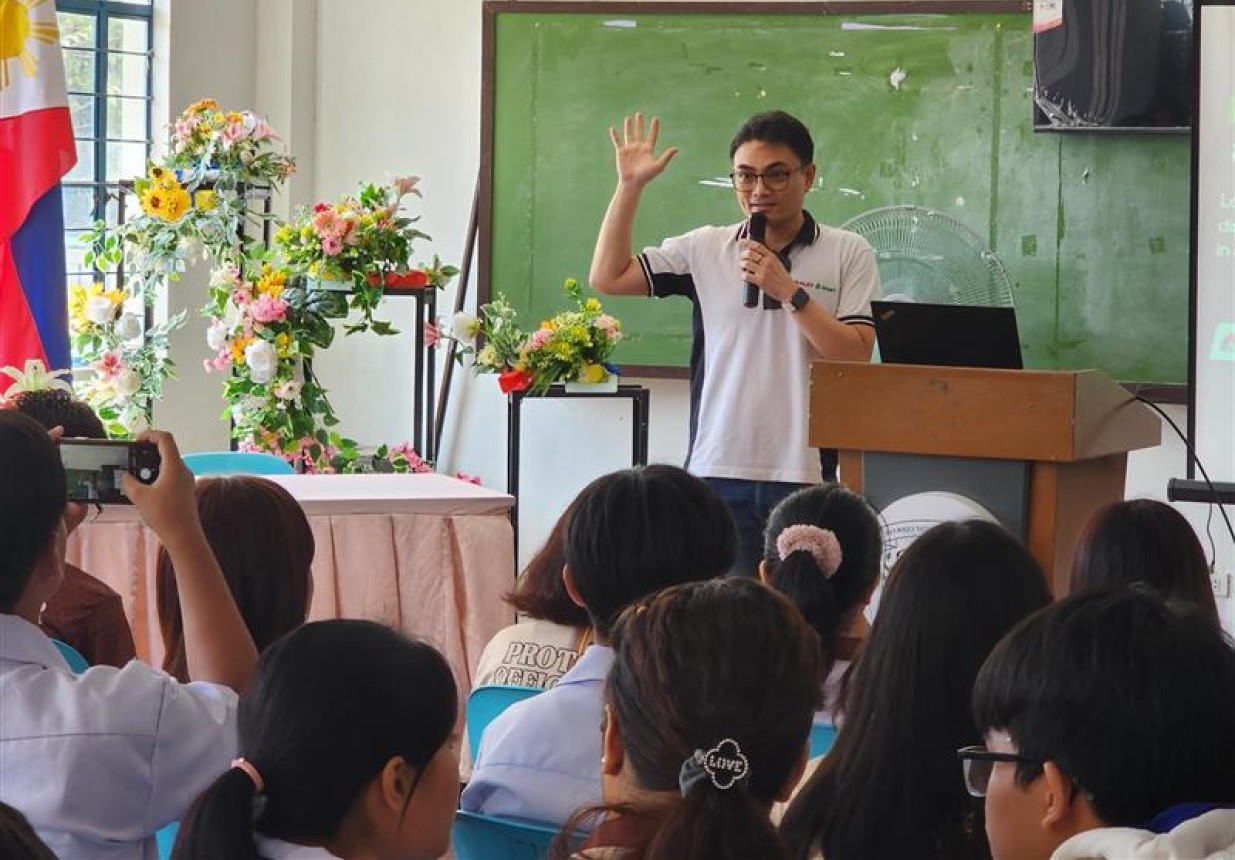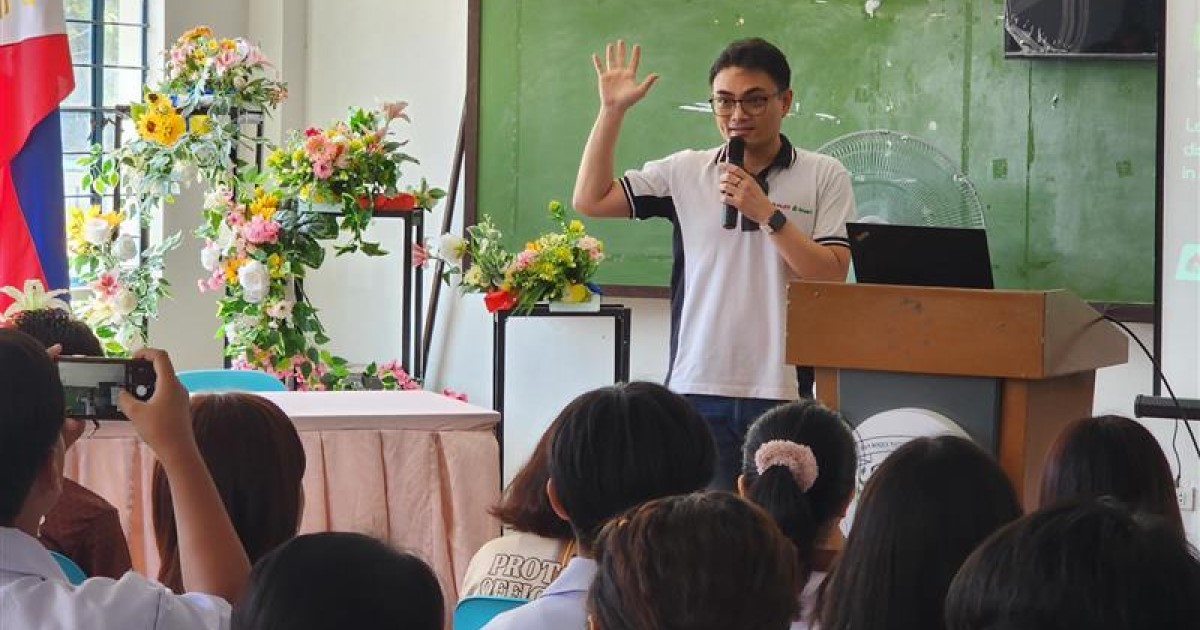
The surge in AI-generated child sexual abuse materials has emerged as a grave and fast-growing online menace. Global reports show that offenders now exploit technology to distort innocent images or craft fake personas to prey on children.
To intensify their fight against this escalating threat, PLDT and Smart, together with the Department of Justice Inter-Agency Council Against Trafficking (DOJ-IACAT), rolled out a cybersecurity awareness caravan in public schools to drive public awareness, strengthen community education, and fortify digital defenses to protect the most vulnerable.
The Barangay IACAT caravan was launched at San Roque National High School in Antipolo City in the province of Rizal where Grades 7-9 students learned how to identify techniques used by predators to lure potential victims. The initiative has since reached other schools in the city.
“Through this program, DOJ-IACAT is investing in prevention strategies against all forms of human trafficking in the grassroots,” said Assistant Secretary Michelle Anne S. Lapuz, DOJ-IACAT. “Itong Anti-Human Trafficking School Caravan sa Antipolo ay isang programa na lumalapit mismo sa mga taong nais nating protektahan… para sila mismo maging handa silang protektahan ang kanilang sarili, mga kaibigan at kapamilya.”
.jpg)
Elijah Mendoza, Digital Communications Senior Manager at Smart, warns students about oversharing on the internet.
As fellow champions of child safety in creating a #BetterTodayforKids, PLDT and Smart trained participants on spotting online threats powered by Artificial Intelligence (AI), as bad actors have turned to AI to produce child sexual abuse and exploitation materials (CSAEM).
“The important thing to remember is to avoid oversharing,” said Elijah Mendoza, Digital Communications Senior Manager at Smart. “Don’t make it easy for predators to steal your photos and personal information from your social media accounts. With AI, they can manipulate your photos and create explicit content.”
To further embed child rights awareness among the youth, PLDT and Smart also turned over copies of their organically developed storybook – ‘Ang Paglalakbay ni Tala’ (The Adventures of Tala) at each leg of the caravan. The book, co-developed with Kids for Kids PH and the Positive Youth Development Network and co-launched with the Department of Justice in November 2024, follows Tala, a 9-year-old girl who explores the metaverse and learns about her rights and different online dangers.
“Knowing how cybercriminals operate helps us identify red flags,” said Shaena May Moslares, a Grade 11 student at Marcelino M. Santos National High School. “Cybersecurity awareness corrects how we behave online, especially in posting personal information on our social media pages.”
.jpg)
PLDT and Smart also turned over copies of their organically developed storybook, "Ang Paglalakbay ni Tala (The Adventures of Tala)."
“We are the custodian of our own body,” said Prince Jharred Bauso, a Grade 9 student at the same school. “For our own safety, let us be careful in sharing our photos and videos online. We should ascertain that we know and trust the person we are chatting with.”
In 2023, the UK-based Internet Watch Foundation (IWF) alerted the public regarding AI-generated child abuse images circulating the dark web. These photos were so realistic that they were ‘virtually indistinguishable from real CSAEM, even to trained analysts.’ The IWF also noted that these manufactured materials feature actual survivors in cruel scenarios.
The Philippines has long been battling sexual abuses against children. The UNICEF had sounded the alarm on the country being the epicenter of online child abuse materials back in 2020. The Justice Department also recorded a more than 200% spike in reports of online sexual exploitation of children in the early months of the COVID-19 pandemic when strict stay-at-home measures were in place. The International Justice Mission’s (IJM) ‘Scale of Harm’ study also revealed that nearly half a million Filipino children were trafficked to produce new illicit child content in 2022.
Recognizing the vulnerability of the youth, PLDT and Smart use technology to amplify government efforts against the online sexual abuse of children. The PLDT Group’s pioneering Child Protection Platform enables its Cyber Security Operations Group to block CSAEM on the more difficult content level. PLDT and Smart’s membership into the IWF and the Canadian Centre for Child Protection further boosted the Group’s blocking capability allowing it to prevent more than half a million attempts to open graphic materials featuring children in the first six months of 2025.
The PLDT Group, likewise, extends its cybersecurity culture to customers though the #BeCyberSmart public information drive. This whole-of-nation approach to cybersecurity ensures PLDT and Smart deliver safe and meaningful connections so customers can live a fuller life. These efforts further underscore the Group’s commitment to UNSDG 16 which promotes peaceful, just, and inclusive societies—particularly by ending violence, exploitation, and abuse of children.


